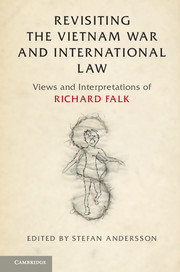Book contents
- Frontmatter
- Dedication
- Contents
- Foreword: The Harmful Legacy of Lawlessness in Vietnam
- Preface
- Acknowledgments
- PART I THE US ROLE IN VIETNAM AND INTERNATIONAL LAW
- PART II WAR AND WAR CRIMES
- 6 A ppropriating Tet
- 7 Son My: War Crimes and Individual Responsibility
- 8 The Cambodian Operation and International Law
- PART III THE VIETNAM WAR AND THE NUREMBERG PRINCIPLES
- PART IV THE LEGACY OF THE VIETNAM WAR
- Index
8 - The Cambodian Operation and International Law
from PART II - WAR AND WAR CRIMES
Published online by Cambridge University Press: 28 December 2017
- Frontmatter
- Dedication
- Contents
- Foreword: The Harmful Legacy of Lawlessness in Vietnam
- Preface
- Acknowledgments
- PART I THE US ROLE IN VIETNAM AND INTERNATIONAL LAW
- PART II WAR AND WAR CRIMES
- 6 A ppropriating Tet
- 7 Son My: War Crimes and Individual Responsibility
- 8 The Cambodian Operation and International Law
- PART III THE VIETNAM WAR AND THE NUREMBERG PRINCIPLES
- PART IV THE LEGACY OF THE VIETNAM WAR
- Index
Summary
I believe the United States has a strong interest in developing rules of international law that limit claimed rights to use armed force and encourage the peaceful resolution of disputes.
John R. Stevenson, Legal Adviser, “United States Military Actions in Cambodia: Questions of International Law,” Department of State Bulletin 62 (1970), 766[P]ublic, Congressional and international support also depends on a prompt and convincing demonstration of the legality of our actions; we cannot afford to wait until action is taken to start preparing our case.
William P. Rogers, Secretary of State, Memorandum dated June 13, 1970, reported in New York Times, June 24, 1970, p. 3The invasion of Cambodian territory by the armed forces of the United States and South Viet-Nam in the spring of 1970 raises serious questions of international law. The development of international law since the end of World War I exhibits a consistent effort to prohibit recourse to force by governments in international society. The Nuremberg Judgment called aggression against a foreign country “the supreme crime” against mankind. The United Nations Charter is built around the notion that the only occasions on which it is legal to use force are in response to an armed attack and as authorized by an organ of the United Nations. The Cambodian operation was obviously neither a response to a prior armed attack upon South Viet-Nam nor an action authorized or ratified by the United Nations. In announcing the decision to the American public on April 30, 1970, President Nixon made no effort to justify the invasion under international law. Such a failure of explanation illustrates the extreme unilateralism that has been exhibited by the United States Government throughout the Viet-Nam War. This failure lends credence to the contention that the United States is conducting an imperial war of repression in Indochina and that it owes explanations for its policy, if at all, only to the American public and, even then, mainly to provide reassurance about the relevance of a challenged policy to the welfare of American troops.
- Type
- Chapter
- Information
- Revisiting the Vietnam War and International LawViews and Interpretations of Richard Falk, pp. 226 - 254Publisher: Cambridge University PressPrint publication year: 2017

